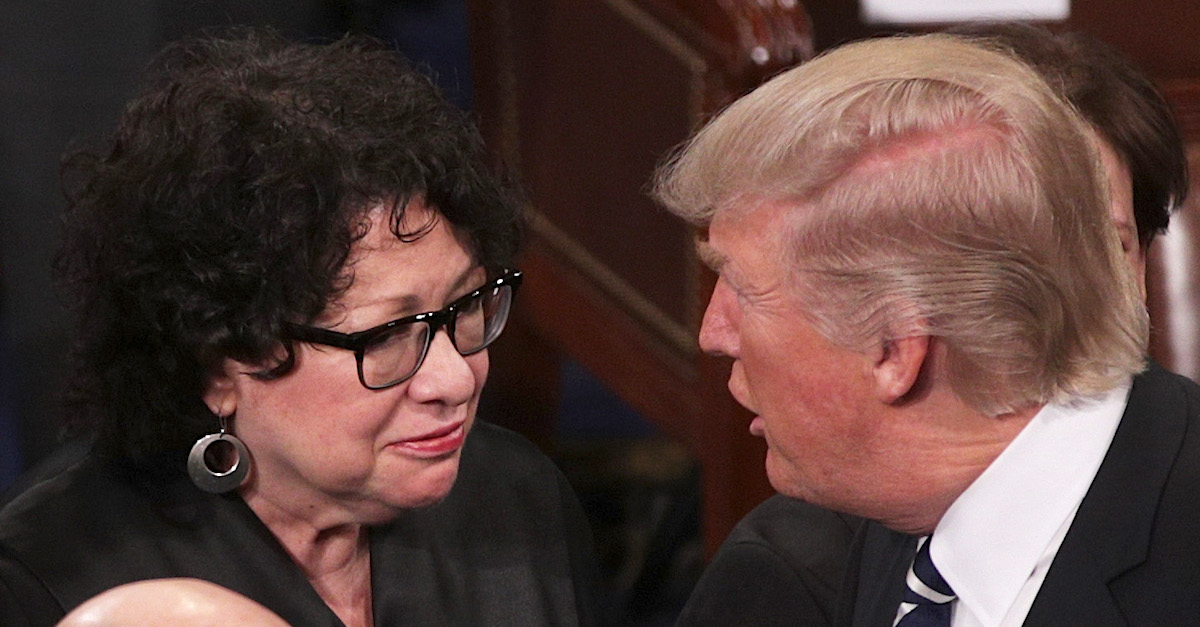
U.S. Supreme Court Justice Sonia Sotomayor, in a separate opinion on Thursday, balked that a plurality of fellow justices — made up of Chief Justice John Roberts and her liberal colleagues Ruth Bader Ginsburg, Stephen Breyer and Elena Kagan — refused to give legal weight to racial comments against Latinos made by President Donald Trump before his administration tried to repeal an Obama-era program which protected from deportation immigrants brought to the United States as children.
The Supreme Court on Thursday declared that the program known as DACA, or Deferred Action for Childhood Arrivals, was rescinded in violation of the Administrative Procedure Act, a series of statutes which govern federal agencies. The Court’s holding did not declare the repeal as having violated the Fifth Amendment to the U.S. Constitution. Sotomayor said that the constitutional argument should have been sent back to the lower courts for further development rather than being discarded by a group of other justices.
“[T]he plurality dismisses the statements that President Trump made both before and after he assumed office,” Sotomayor wrote. “[T]he . . . complaints catalog then-candidate Trump’s declarations that Mexican immigrants are ‘people that have lots of problems,’ ‘the bad ones,’ and ‘criminals, drug dealers, [and] rapists.'” Trump also “compared undocumented immigrants” to “animals” responsible for “the drugs, the gangs, the cartels, the crisis of smuggling and trafficking, [and] MS13,” Sotomayor noted. “The plurality brushes these aside as “unilluminating,” “remote in time,” and having been “made in unrelated contexts.”
Instead, Sotomayor argued that those comments did “bear on unlawful migration from Mexico—a keystone of President Trump’s campaign and a policy priority of his administration—and, according to respondents, were an animating force behind the rescission of DACA.”
“Taken together, the words of the President help to create the strong perception that the rescission decision was contaminated by impermissible discriminatory animus,” Sotomayor said (internal quotations omitted). “This perception provides respondents with grounds to litigate their equal protection claims further.”
The Fifth Amendment claims were still in their “preliminary posture,” Sotomayor wrote, but were strong enough to make it into additional rounds of litigation. “But the Court forecloses any challenge to the rescission [of DACA] under the Equal Protection Clause. I believe that determination is unwarranted on the existing record and premature at this stage of the litigation. I would instead permit respondents to develop their equal protection claims on remand.”
Here is how several other justices brushed aside the arguments which Sotomayor said deserved great weight. Among them is the rather surprising supposition that Trump was not directly in charge of his own administration’s decision to jettison DACA:
The Government contends that the allegation that the Executive, motivated by animus, ended a program that disproportionately benefits certain ethnic groups is a selective enforcement claim. Such a claim, the Government asserts, is barred by our decision in Reno v. American-Arab Anti Discrimination Committee. See 525 U. S., at 488 (holding that “an alien unlawfully in this country has no constitutional right to assert selective enforcement as a defense against his deportation”). Respondents counter that their claim falls outside the scope of that precedent because they are not challenging individual enforcement proceedings. We need not resolve this debate because, even if the claim is cognizable, the allegations here are insufficient.
[ . . . ]
[T]here is nothing irregular about the history leading up to the September 2017 rescission.
[ . . . ]
Finally, the cited statements are unilluminating. The relevant actors were most directly Acting Secretary Duke and the Attorney General.
[ . . . ]
Thus, like respondents’ other points, the statements fail to raise a plausible inference that the rescission was motivated by animus.
Sotomayor believed that “the plurality minimize[d] the disproportionate impact of the [DACA] rescission decision on Latinos” by disregarding Trump’s racial comments and tossing the Fifth Amendment claim. “I would not so readily dismiss the allegation that an executive decision disproportionately harms the same racial group that the President branded as less desirable mere months earlier,” she wrote.
Here is the core of the court’s more narrow holding on DACA (citation and internal quotations removed):
We do not decide whether DACA or its rescission are sound policies. The wisdom of those decisions is none of our concern. We address only whether [DHS] complied with the procedural requirement that it provide a reasoned explanation for its action. Here the agency failed to consider the conspicuous issues of whether to retain forbearance and what if anything to do about the hardship to DACA recipients. That dual failure raises doubts about whether the agency appreciated the scope of its discretion or exercised that discretion in a reasonable manner. The appropriate recourse is therefore to remand to DHS so that it may consider the problem anew.
The opinion boils down to this: Sotomayor is the only justice who wanted to allow those who stayed in America due to DACA — the so-called “Dreamers” — to attack the program’s cancellation on constitutional grounds tied factually to Trump’s racial comments involving Latinos. The rest of the justices who in essence agreed to keep DACA in place for now (Roberts, Ginsburg, Breyer, and Kagan) are only willing to allow the Dreamers to attack DACA’s cancellation under administrative procedure law. The dissent (Thomas, Alito, and Gorsuch) argued that DACA was illegally implemented in the first place; those three conservative justices are willing to let it disappear the way it came in and without allowing the Dreamers a fight. Justice Kavanaugh, in a separate dissent, summed up the holding this way: “all nine Members of the Court accept, as do the DACA plaintiffs themselves, that the Executive Branch possesses the legal authority to rescind DACA and to resume pre-DACA enforcement of the immigration laws enacted by Congress.”
Editor’s note: this report was updated shortly after its initial publication to include the final paragraph above as a broader conclusion.
[Photo by Alex Wong/Getty Images]